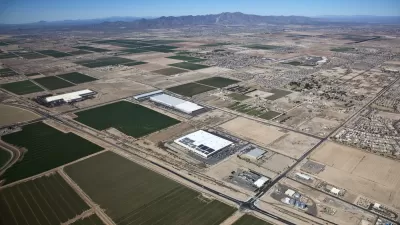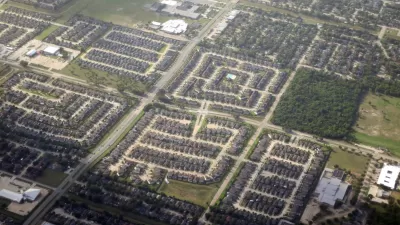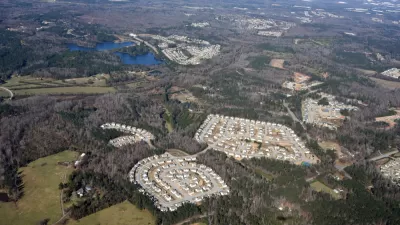Charles Marohn explains how cities and towns failed to consider the future expense of expanded infrastructure to new suburban developments.
In a two-part series, Marohn looks at how American cities came to believe that suburban sprawl was a key to prosperity and turned a blind eye to the expense of the expanded infrastructure. The Federal Department of Transportation played a key role, says Marohn:
"...the initial cost to the local government for new growth is minimal. If the state or federal government provides a grant or low-interest loan to subsidize a project -- for example, the extension of a sewer or water line -- the local government may have to pay something, but it is nowhere near the total cost. Where the DOT comes in and builds a highway, widens a road, puts in a signal, builds an overpass, etc... there may be some local funds contributed, but again, the vast overwhelming majority of the money is spent by the DOT."
FULL STORY: The growth Ponzi scheme, part 1

Planetizen Federal Action Tracker
A weekly monitor of how Trump’s orders and actions are impacting planners and planning in America.

San Francisco's School District Spent $105M To Build Affordable Housing for Teachers — And That's Just the Beginning
SFUSD joins a growing list of school districts using their land holdings to address housing affordability challenges faced by their own employees.

The Tiny, Adorable $7,000 Car Turning Japan Onto EVs
The single seat Mibot charges from a regular plug as quickly as an iPad, and is about half the price of an average EV.

Seattle's Plan for Adopting Driverless Cars
Equity, safety, accessibility and affordability are front of mind as the city prepares for robotaxis and other autonomous vehicles.

As Trump Phases Out FEMA, Is It Time to Flee the Floodplains?
With less federal funding available for disaster relief efforts, the need to relocate at-risk communities is more urgent than ever.

With Protected Lanes, 460% More People Commute by Bike
For those needing more ammo, more data proving what we already knew is here.
Urban Design for Planners 1: Software Tools
This six-course series explores essential urban design concepts using open source software and equips planners with the tools they need to participate fully in the urban design process.
Planning for Universal Design
Learn the tools for implementing Universal Design in planning regulations.
Smith Gee Studio
City of Charlotte
City of Camden Redevelopment Agency
City of Astoria
Transportation Research & Education Center (TREC) at Portland State University
US High Speed Rail Association
City of Camden Redevelopment Agency
Municipality of Princeton (NJ)





























